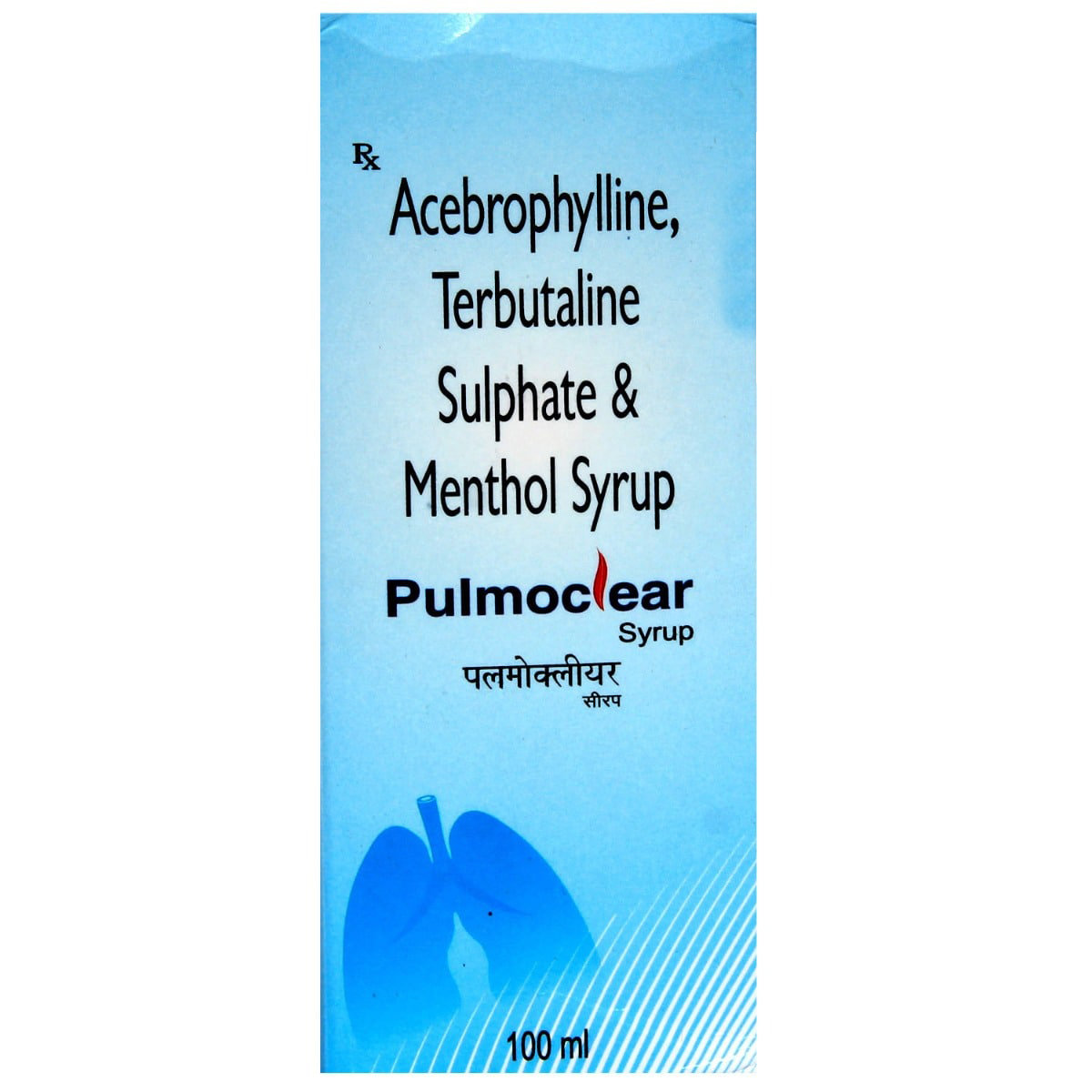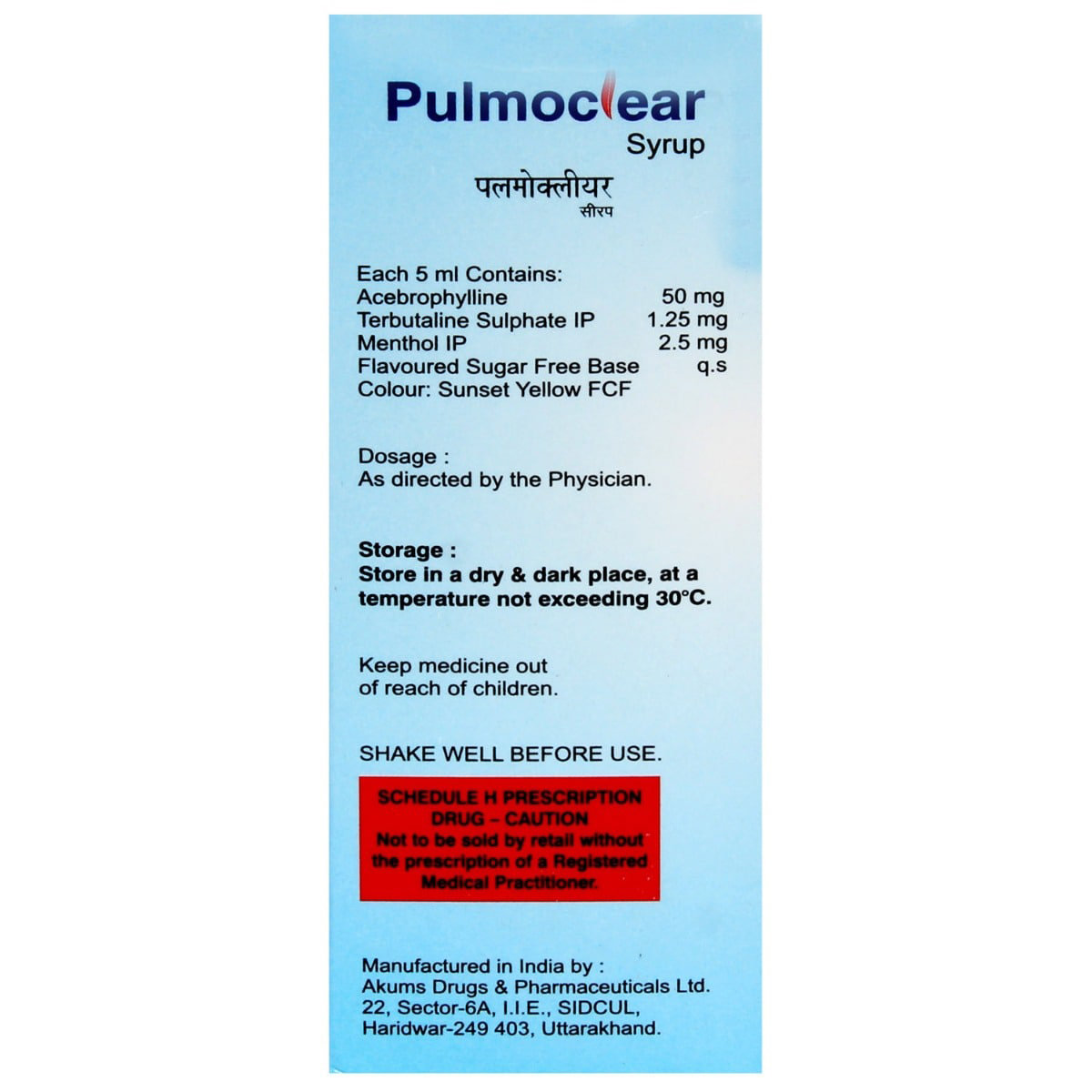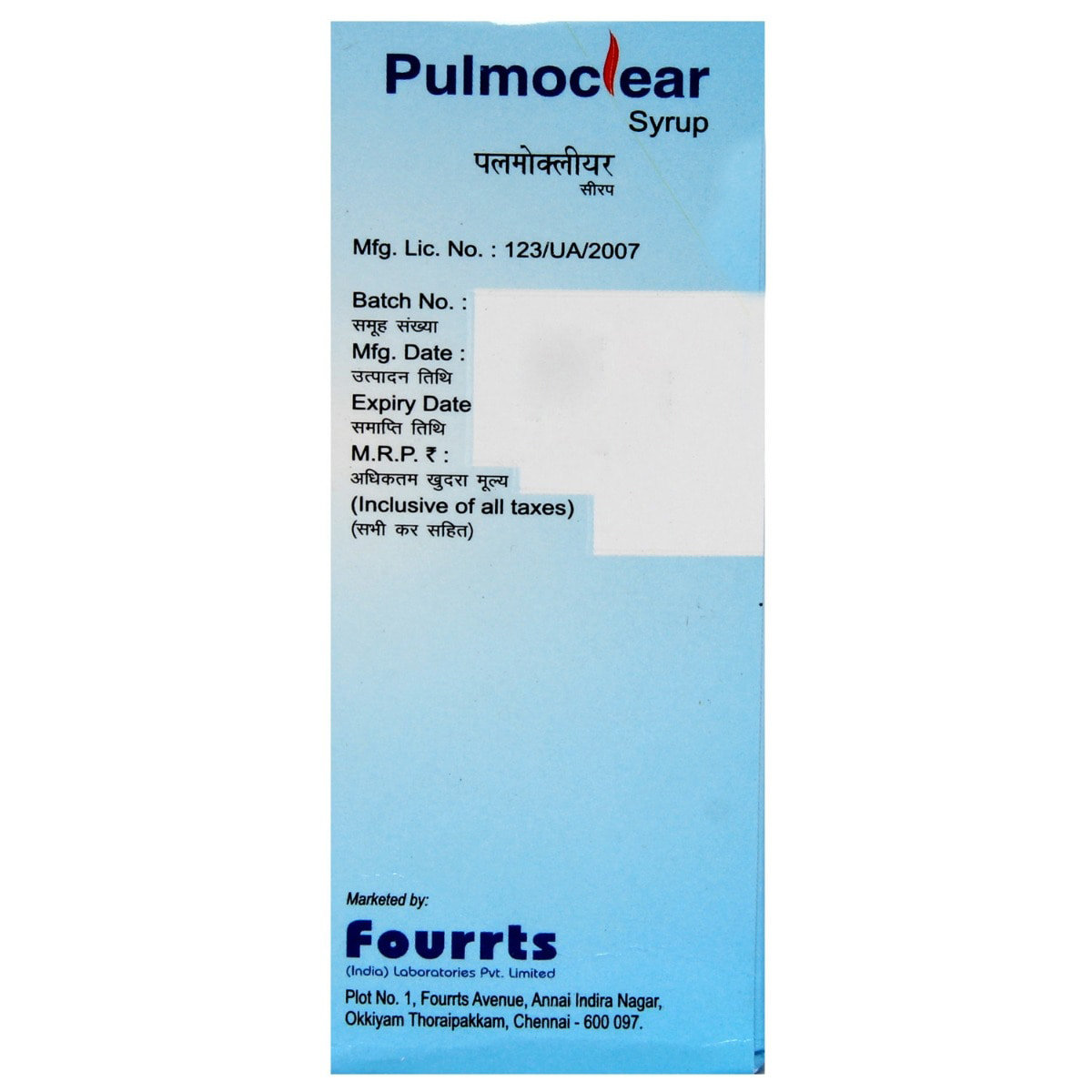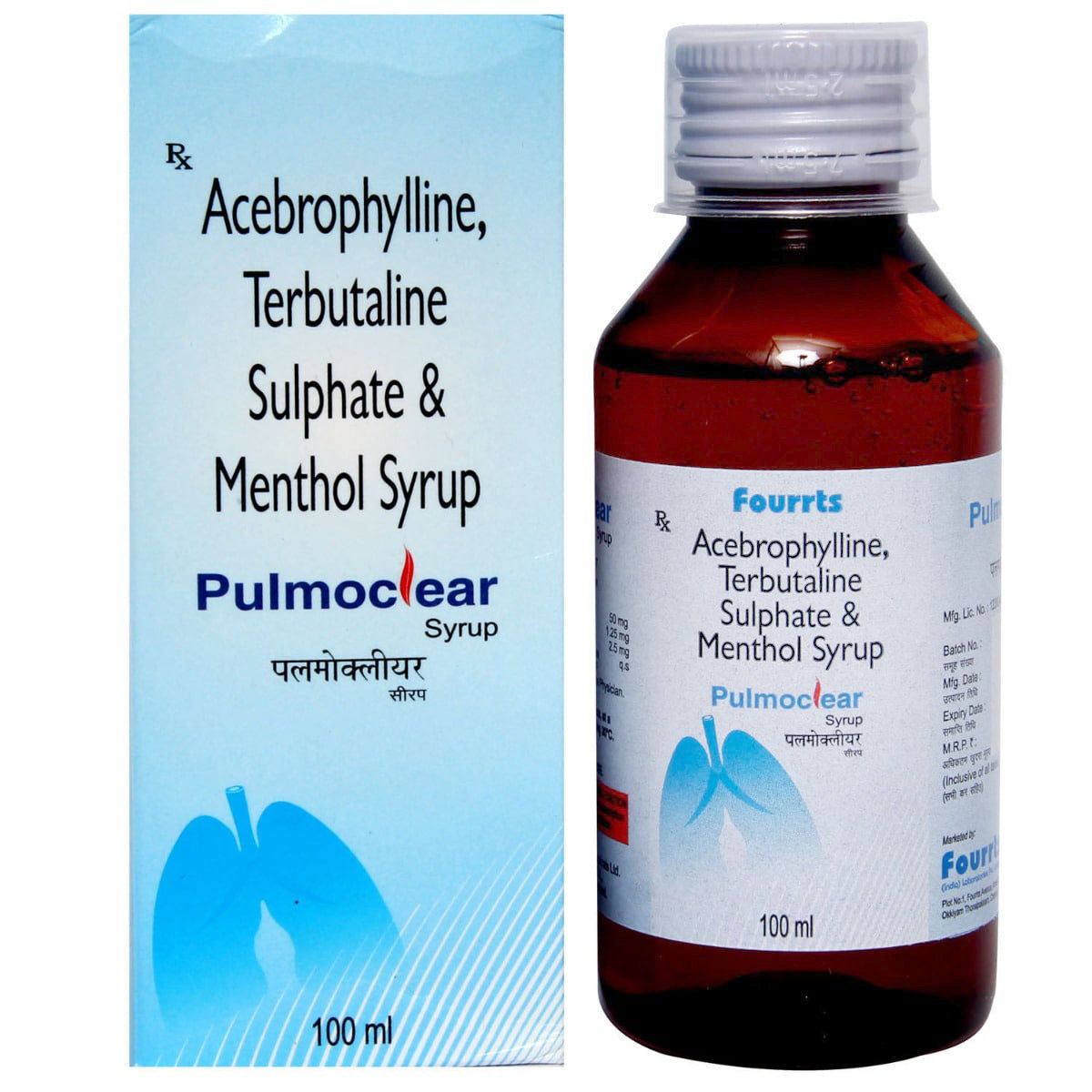Pulmoclear Syrup




MRP ₹150
(Inclusive of all Taxes)
₹22.5 Cashback (15%)
know your delivery time
Provide Delivery Location
Composition :
Manufacturer/Marketer :
Consume Type :
Expires on or after :
Return Policy :
Selected Pack Size:100 ml
100 ml ₹135
(₹1.35 per ml)
In Stock

Secure Payment

Trusted by 8 Crore Indians

Genuine Products
Therapeutic Class
Country of origin
Manufacturer/Marketer address
Author Details
We provide you with authentic, trustworthy and relevant information
Disclaimer
Alcohol
Safe if prescribed
Consumption of alcohol may increase the risk of side effects such as drowsiness. So, limit alcohol intake until your condition improves.
Pregnancy
Consult your doctor
Pulmoclear Syrup should not be taken until recommended. Your doctor will weigh the benefits and potential risks before advising them. Please consult your doctor.
Breast Feeding
Consult your doctor
Pulmoclear Syrup passes into breast milk and causes harmful effects to the nursing baby. So, its use should be avoided in breastfeeding mothers.
Driving
Safe if prescribed
Pulmoclear Syrup may cause drowsiness. So, driving or operating heavy machinery is not advised.
Liver
Consult your doctor
Pulmoclear Syrup should be used with caution in patients with liver diseases. The dose may have to be adjusted by your doctor.
Kidney
Consult your doctor
Pulmoclear Syrup should be used with caution in patients with kidney diseases. The dose may have to be adjusted by your doctor.
Children
Safe if prescribed
Pulmoclear Syrup to be taken with caution, especially if you are children below 12. Your doctor may adjust your dose depending on your age.
Product Substitutes
About Pulmoclear Syrup
Pulmoclear Syrup belongs to the class of medicines called ‘expectorants’ primarily used to treat Asthma and Chronic obstructive pulmonary disease (COPD). Asthma is a chronic breathing problem that affects the airways in the lungs. These airways, also known as bronchial tubes, allow air to move in and out of the lungs. Chronic obstructive pulmonary disease (COPD) is a chronic lung disorder in which there is difficulty emptying the air of the lungs (airflow obstruction). Due to this obstruction, patients experience difficulty in breathing.
Acebrophylline, Terbutaline, and Menthol are the active ingredients in Pulmoclear Syrup . Acebrophylline is a bronchodilator and a mucolytic. It works by relaxing the muscles of the airways as well as thinning and loosening mucus, making breathing easier. Terbutaline functions as a bronchodilator. It works by relaxing airway muscles and widening airways. This makes it easier to breathe. Menthol is an organic chemical that generates a cooling feeling and reduces minor throat irritation. Thus, Pulmoclear Syrup relieves the symptoms of Asthma and Chronic obstructive pulmonary disease (COPD).
Take this medicine as recommended. The common side effects of Pulmoclear Syrup are stomach pain or discomfort, vomiting, constipation, heartburn, loss of appetite, drowsiness, dizziness, skin rash, itching, nervousness, tremors, and headache. Most of these side effects of Pulmoclear Syrup do not require medical attention and gradually resolve over time. However, if the side effects persist or worsen, please consult your doctor immediately.
Do not take Pulmoclear Syrup if you are allergic to any components present in it. Before taking Pulmoclear Syrup , inform your doctor if you have diabetes, fits, hypotension (low blood pressure), overactive thyroid, hypokalemia (low potassium levels in the blood), stomach ulcers, phenylketonuria (a birth defect that causes accumulation of amino acid, phenylalanine in the body), arrhythmias (abnormal heart rhythms), and kidney, liver or heart problems. Also, inform your doctor if you are pregnant, planning to become pregnant, or breastfeeding.
Uses of Pulmoclear Syrup
Medicinal Benefits Mweb
Key Benefits
Acebrophylline, Terbutaline, and Menthol are the active ingredients in Pulmoclear Syrup . Acebrophylline is a bronchodilator and a mucolytic. It works by relaxing the muscles of the airways as well as thinning and loosening mucus, making breathing easier. Terbutaline functions as a bronchodilator. It works by relaxing airway muscles and widening airways. This makes it easier to breathe. Menthol is an organic chemical that generates a cooling feeling and reduces minor throat irritation. Altogether it relieves the symptoms of Asthma and Chronic obstructive pulmonary disease (COPD).
Directions for Use
Side Effects of Pulmoclear Syrup
- Drowsiness
- Dizziness
- Skin rash
- Stomach pain or discomfort
- Vomiting
- Constipation
- Heartburn
- Loss of appetite
- Itching
- Nervousness
- Headache
Drug Warnings
If you are pregnant or breastfeeding, it is advised to inform your doctor before using the Pulmoclear Syrup . Pulmoclear Syrup should be used with caution in patients with heart diseases, liver problems, kidney diseases, electrolyte disturbances, thyroid disorders, and arrhythmias (abnormal heart rhythms). Pulmoclear Syrup should be used with caution in patients with fits, as it may increase the recurrence of fits. Pulmoclear Syrup may raise blood glucose levels, so this medicine should be used with caution in patients with diabetes. Pulmoclear Syrup should be used with caution in elderly patients as they are more prone to side effects such as dizziness and drowsiness.
Drug-Drug Interactions
Drug-Drug Interactions
Login/Sign Up
-
How to manage the interaction:
Co-administration of Pulmoclear Syrup 100 ml with Procarbazine can possibly result in an interaction, but it can be taken if your doctor has advised it. Do not discontinue any medications without first consulting your doctor.
Taking Pulmoclear Syrup 100 ml with ceritinib can increase the risk of irregular heart rhythm.
How to manage the interaction:
Although there is a interaction between Ceritinib and Pulmoclear Syrup 100 ml, you can take these medicines together if prescribed by your doctor. However, consult your doctor immediately if you experience symptoms such as dizziness, lightheadedness, fainting, shortness of breath, or heart palpitations. Do not stop using any medications without talking to a doctor.
Combining Pulmoclear Syrup 100 ml and nilotinib can increase the risk of an irregular heart rhythm.
How to manage the interaction:
Taking Pulmoclear Syrup 100 ml and nilotinib together can lead to an interaction, it can be taken if advised by your doctor. However, if you experience any symptoms like sudden dizziness, lightheadedness, fainting, shortness of breath, heart palpitations, diarrhea, or vomiting, contact your doctor immediately. Do not discontinue any medications without first consulting your doctor.
Taking Gatifloxacin and Pulmoclear Syrup 100 ml can increase the risk or severity of irregular heart rhythms. The risk increases in patients with a history of heart illness or electrolyte imbalance.
How to manage the interaction:
Taking Gatifloxacin and Pulmoclear Syrup 100 ml together can possibly result in an interaction, it can be taken if your doctor has advised it. However, if you experience sudden dizziness, lightheadedness, fainting, shortness of breath, chest pain or tightness, rapid heartbeat, or memory loss, contact a doctor immediately. Do not discontinue any medications without consulting a doctor.
Using Pulmoclear Syrup 100 ml together with amisulpride can increase the risk of severe irregular heart rhythm.
How to manage the interaction:
Amisulpride and Pulmoclear Syrup 100 ml can cause an interaction, but it can be taken if prescribed by a doctor. You should seek immediate medical attention if you develop sudden dizziness, lightheadedness, fainting, shortness of breath, or heart palpitations. Do not stop using any medications without talking to a doctor.
Co-administration of Labetalol and Pulmoclear Syrup 100 ml together can decrease the medical benefits of both medications.
How to manage the interaction:
Although taking Labetalol and Pulmoclear Syrup 100 ml together can result in an interaction, it can be taken if a doctor has prescribed it. Do not forget to inform the doctor if you have severe chronic obstructive pulmonary disease (COPD) or a history of asthma, as labetalol is often not advised in these conditions. Do not discontinue any medications without a doctor's advice.
Using sotalol together with Pulmoclear Syrup 100 ml may reduce the benefits of both medications since they have opposing effects in the body.
How to manage the interaction:
Taking Sotalol with Pulmoclear Syrup 100 ml together can result in an interaction, but it can be taken if a doctor has advised it. Do not stop using any medications without a doctor's advice.
Combining Tranylcypromine with Pulmoclear Syrup 100 ml can increase the risk of high blood pressure.
How to manage the interaction:
Although taking Pulmoclear Syrup 100 ml and Tranylcypromine together can evidently cause an interaction, it can be taken if your doctor has suggested it. If you take multiple medications that can raise your blood pressure, it may increase your risk of having high blood pressure while lying down. It's important to regularly check your blood pressure, especially when lying down or with your head elevated, and watch out for any signs of side effects. Do not stop using any medications without a doctor's advice.
Taking Carvedilol and Pulmoclear Syrup 100 ml may reduce the beneficial effects of both medications.
How to manage the interaction:
There may be a possibility of interaction between Pulmoclear Syrup 100 ml and Carvedilol, but it can be taken if prescribed by a doctor. Consult your doctor immediately if you experience shortness of breath, palpitations, or chest discomfort. Do not stop using any medications without a doctor's advice.
Using propranolol together with Pulmoclear Syrup 100 ml may reduce the benefits of both medications, since they have opposing effects in the body. In addition, propranolol can sometimes cause breathing problems.
How to manage the interaction:
Although taking Propranolol together with Pulmoclear Syrup 100 ml can possibly result in an interaction, they can be taken together if prescribed by your doctor. However, if you experience any unusual symptoms contact your doctor immediately. Do not stop using any medications without first talking to your doctor.
Drug-Food Interactions
Drug-Food Interactions
Login/Sign Up
Drug-Diseases Interactions
Drug-Diseases Interactions
Login/Sign Up
Habit Forming
Special Advise
- Regular monitoring of blood sugars is advised as Pulmoclear Syrup may cause fluctuation in blood sugars.
Diet & Lifestyle Advise
- Avoid dairy products such as milk as they may increase mucus production. Also, avoid processed or refined foods to have relief from cough. Instead, replace baked foods, fried foods, white bread, white pasta, French fries, sugary desserts, and chips with green leafy vegetables.
- Drink plenty of fluids to avoid dry throat while you cough and loosen mucus.
- Avoid citrus fruits as they may worsen the cough. Eat fruits rich in water content, such as pears, watermelon, peaches, and pineapples. Honey can also help to reduce cough.
- Use a cool-mist humidifier as it may help ease coughing.
All Substitutes & Brand Comparisons
RX
Ebclear Sugar Free Syrup 100 ml
Mmc Pharmaceuticals Ltd
₹131
(₹1.18/ 1ml)
12% CHEAPERRX
Oxydex Syrup 60 ml
Apex Laboratories Pvt Ltd
₹92.5
(₹1.39/ 1ml)
2% COSTLIER

Have a query?
Buy best Respiratory System products by
Cipla Ltd
Lupin Ltd
Glenmark Pharmaceuticals Ltd
Sun Pharmaceutical Industries Ltd
Alkem Laboratories Ltd
Macleods Pharmaceuticals Ltd
Mankind Pharma Pvt Ltd
Zydus Healthcare Ltd
Leeford Healthcare Ltd
Dr Reddy's Laboratories Ltd
Zydus Cadila
Abbott India Ltd
Intas Pharmaceuticals Ltd
Alembic Pharmaceuticals Ltd
German Remedies Ltd
Centaur Pharmaceuticals Pvt Ltd
Ipca Laboratories Ltd
Aristo Pharmaceuticals Pvt Ltd
Pristine Pearl Pharma Pvt Ltd
Wockhardt Ltd
GlaxoSmithKline Pharmaceuticals Ltd
Zuventus Healthcare Ltd
Koye Pharmaceuticals Pvt Ltd
Micro Labs Ltd
Blue Cross Laboratories Pvt Ltd
Medishri Healthcare Pvt Ltd
Med Manor Organics Pvt Ltd
Indiabulls Pharmaceuticals Pvt Ltd
Adonis Laboratories Pvt Ltd
FDC Ltd
Fourrts India Laboratories Pvt Ltd
Tablets India Ltd
J B Chemicals & Pharmaceuticals Ltd
Shreya Life Sciences Pvt Ltd
Divine Savior Pvt Ltd
Indoco Remedies Ltd
Seagull Pharmaceutical Pvt Ltd
Yash Pharma Laboratories Pvt Ltd
Torque Pharmaceuticals Pvt Ltd
Uniza Healthcare Llp
Wings Pharmacuticals Pvt Ltd
Biological E Ltd
Corona Remedies Pvt Ltd
Icarus Health Care Pvt Ltd
Steris Healthcare
Apex Laboratories Pvt Ltd
Geno Pharmaceuticals Pvt Ltd
Navil Laboratories Pvt Ltd
Precept Pharma
Aar Ess Remedies Pvt Ltd
La Renon Healthcare Pvt Ltd
Torrent Pharmaceuticals Ltd
Astra Zeneca Pharma India Ltd
Biochem Pharmaceutical Industries Ltd
Comed Chemicals Ltd
Entod Pharmaceuticals Ltd
Franco Indian Pharmaceuticals Pvt Ltd
Healthgate Pvt Ltd
Intra Life Pvt Ltd
Megma Healthcare Pvt Ltd
Pfizer Ltd
RPG Life Sciences Ltd
Unipark Biotech Pvt Ltd
Votary Laboratories (India) Ltd
Wanbury Ltd
Brinton Pharmaceuticals Ltd
Dolvis Bio Pharma Pvt Ltd
Eisen Pharmaceutical Co Pvt Ltd
Group Pharmaceuticals Ltd
Knoll Pharmaceuticals Ltd
Morepen Laboratories Ltd
Panacea Biotec Ltd
Prevego Healthcare & Research Pvt Ltd
Rnd Laboratories Pvt Ltd
Sanatra Healthcare Ltd
Skn Organics Pvt Ltd
Stedman Pharmaceuticals Pvt Ltd
Thuyam Life Pvt Ltd
Timon Pharmaceuticals Pvt Ltd
Aglowmed Pharmaceuticals Ltd
Ajanta Pharma Ltd
Alniche Life Sciences Pvt Ltd
Bio Warriors Pharmaceucticals Pvt Ltd
Biochemix Health Care Pvt Ltd
Cadila Healthcare Ltd
Cadila Pharmaceuticals Ltd
Caplet India Pvt Ltd
Chemo Healthcare Pvt Ltd
Delcure Life Sciences Ltd
East West Pharma India Pvt Ltd
Elder Pharmaceuticals Ltd
Embiotic Laboratories (P) Ltd
Emcee Pharmaceuticals (P) Ltd
Foregen Healthcare Ltd
Hetero Healthcare Pvt Ltd
Incite Pharmaceuticals
Iva Healthcare Pvt Ltd
Kepler Healthcare Pvt Ltd
Kristal Pharmaceuticals
Lincoln Pharmaceuticals Ltd
Customers Also Bought






